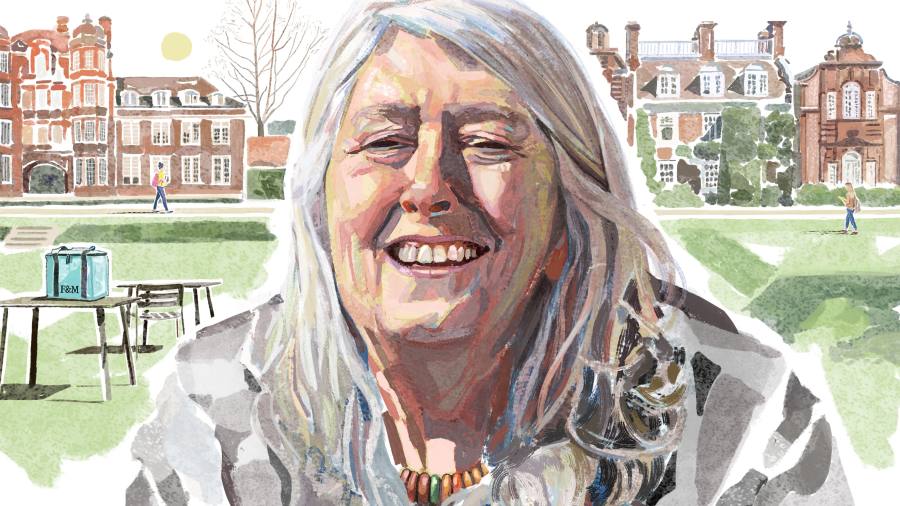[ad_1]
A manicured lawn, a gently warming sun, undergraduates fizzing and fretting, a picnic with an eminent academic. It could hardly be a more typical spring scene in Cambridge. Except this is no typical spring. England may just have relaxed its lockdown rules, allowing outdoor dining, but every restaurant that my guest suggested was already booked. A picnic is our lunch of last resort.
Lunch with Mary Beard, arguably the world’s best-known classics professor, was never going to be a run-of-the-mill affair. The ancient historian is not just an acclaimed broadcaster and author, but also a fearless social-media warrior known for firing back at the abuse that has tracked her rise from expert on ancient Rome to global media star.
Our picnic is not run-of-the-mill either. I have ordered a hamper from Fortnum & Mason, grocers to the Queen, which Beard starts unpacking at the opposite end of a picnic table in the garden of Newnham College, where she has been a fellow for almost 40 years. Slightly to my surprise, you don’t get a wicker basket with the £125 Piccadilly Platter, instead a less chic — though more practical on this warm April day — cool bag in Fortnum’s trademark eau-de-nil.
Picnicking in the age of corona is no simple task. Beard furnishes me with an extra fork, since dividing up the food — Scotch eggs, Tempus Charcuterie’s fancy ham, a Northern Irish Brie-like cheese — now has to be conducted with the delicacy of neurosurgery and a ducal politesse. She pours half a jar of green olives in brine into a plastic cup for me and I tip flaky Stilton cheese straws on to my plate.
Since the plague is already steering our lunch, I ask her whether it’s useful to compare it to epidemics of the ancient world — the one that carried off the revered Athenian leader Pericles in 429BC, or the sixth-century AD Justinian outbreak that by some estimates killed 30m-50m. “It is, in the way that it always gives you a view from outside yourself,” she says. Ancient history doesn’t offer “a nice off-the-peg solution” but does teach you that “all kinds of reactions that we think of as natural reactions are hugely cultural and other people have different ones”.
“To some extent, you cease to be sniffy about the ancient religious response — it’s very easy to laugh at fifth-century Greeks who thought it was all punishment from the gods, similarly Homer.” In fact, she says, as I reach for the nearest glass and almost drink olive brine instead of sparkling water, “what most of us understand about Covid is no more or less magical than what the ancients did.” If the ancient Greeks prayed to Asclepius, god of medicine, then government incantations of “hands — face — space” and popular faith in (but not necessarily grasp of) “the science” don’t seem all that different.
The pandemic has been relentlessly hard on students. Across the UK they have been paying tuition fees and in many cases rent but for only a fraction if anything of the university experience — no in-person classes, no joining random societies, no hangovers and so on. And most universities have been at best patchily responsive to their students’ plight. As we crunch on crackers, I ask if Covid-19 has shown Cambridge anything it should change.
In words that may make some of her students rejoice, Beard believes that the pandemic will lead to some routines changing for the better. She endorses reform of the “fetishisation of sitting down and writing for three hours” in overly frequent exams and says that the in-person lecture is probably dead too. She will miss the “eyeball-to-eyeball” instant feedback the lecturer has, but says that students like a package of pre-recorded lectures — “it’s nice to be able to binge-watch”. What’s ancient Greek for “Netflix”?
After an undergraduate degree at Newnham, where she has said she was “a disguising swot”, Beard began her teaching career at King’s College London, before rejoining Newnham as a tutor in 1984 and making her academic name through publications on Roman religions. She has long had a prominent media profile, initially in her role since 1992 as Classics editor of The Times Literary Supplement, and as a blogger on its website, where she is as likely to write about Amazon reviews as the Roman idea of breakfast.
But it has been since her 2008 book Pompeii: The Life of a Roman Town that Beard has become the global face of ancient Greek and Roman studies, distinctive on her TV documentaries with her fresh perspectives, her long silver hair and her bright sneakers. (Today: gold.) She is now such a brand that her programmes bear her name: Meet the Romans with Mary Beard or Mary Beard’s Ultimate Rome: Empire Without Limit.
Classics, the study of the literature, philosophy and history of the ancient Greek and Roman worlds, long occupied a foremost place in the western cultural and political imagination. It encompasses everything from the Greek epic poems The Iliad and The Odyssey and the philosophers Socrates, Plato and Aristotle, to the rise of Athenian democracy, the fall of the Roman republic and the theatres, baths and libraries that the Romans left from Scotland to the Sahara. Dante drew on Virgil, Karl Marx on Aristotle. Political scientists still bandy about the term “Thucydides Trap”, named after the Greek historian, to describe how rising powers come into conflict with established ones.
Beard, however, is far more than an advocate for the relevance of the ancient world. What has made her books and documentaries so refreshing is her scepticism: she is willing to demolish things long held as true about the ancients. She has also been part of the movement to expand Classics’ boundaries, leading early courses on women and the body, for example, when women — along with slaves, migrants and regions outside Italy and Greece — were marginalised by the mainstream. The Roman empire is a “history of people of colour”, she says. Another example is her focus on Rome’s evolving cosmopolitanism: she concludes SPQR, her history of Rome, with the grant of citizenship by the emperor Caracalla in AD212 to more than 30m people — men, of course — across the empire.
Back in 1984, Beard was the only female lecturer in Cambridge’s Classics faculty and she has long been agitating for diversifying the make-up of its academics and broadening the background of its students. Classics has traditionally in the UK been dominated by the private schools. Despite her efforts and those of her colleagues, success, she concedes, has been variable: there are more women and more young people, she says, but the discipline is hardly less white. “You only have to walk around a classical conference . . . to see that this is . . . not a diverse subject,” she says.
In the past few years, there have been signs in the US of something of a civil war within the discipline: one prominent Classicist of colour has even called for the subject to be detonated. In January 2019, an attendee at a San Diego conference said Classics should be defended and celebrated as the foundation of western culture, before seeming to suggest that Princeton academic Dan-el Padilla Peralta might have got his job because he was black. He replied: “Here’s what I have to say about the vision of classics that you outlined: I want nothing to do with it. I hope the field dies that you’ve outlined, and that it dies as swiftly as possible.”
Picnic hamper menu
Fortnum & Mason
181 Piccadilly, St James’s, London W1A
The Piccadilly Platter £125
Triple cream cheese
Waxed cheddar truckle
All butter crackers
Stilton cheese straws
Pickled cornichons
Fortnum’s green olives
Spiced coppa ham
King Peter ham from Tempus Charcuterie
Fortnum’s Scotch eggs X4
Bottle of Pouilly-Fumé
Bottle of Muscadet sur Lie
Dark chocolate florentines £9.95
Beard is sympathetic to the push for reform, though not for demolishing the faculty: “I have absolutely no doubt that Classics ought to change — I thought it ought to change when I was an undergraduate.” But she is extremely wary of arguments for closing down Classics as a subject and absorbing it into global ancient world studies or reassigning its limbs — history, philosophy, literature, art, archaeology — to their respective faculties.
“This seems extremely cowardly to say this,” she says, “but this is not going to be a good time for the humanities in terms of funding over the next five, 10, maybe 20 years . . . Classics departments are being shut down, they’re being merged. In terms of simple politics, I think whatever arguments we’re having — which we should have — we shouldn’t be delivering them up on a plate as a hatchet ready for the administration to use against you.”
Beard continues as I hack away at a scotch egg, whose yolk (within the layers of meat and breadcrumbs) is orange and impressively runny. “I think that it’s quite easy,” she says, “to keep all your principles intact and end up with a result which is not what you wanted.”
One of the tropes of the recent populist era has been the misquoting of the ancient world by white supremacists: rioters at the US Capitol in January wore ancient Greek military helmets as if protecting the nation from “barbarians” and waved flags with the Greek tag “Molon labe” (“Come and take them”) as a threat to those who want to regulate guns. These people are “largely stupid, sad and nasty . . . and don’t know much about the ancient world”, Beard says.
She points to more positive uses of Classics — Victorian reformers looking to Athenian democracy, Oscar Wilde exploring homoerotics through Greek predecessors — and talks about how these arguments are “crudified” on social media. I start to ask about the reformers in Classics who want to absorb it into other subjects when Beard takes a turn for the stern. “I’m a reformer,” she says, arguing that the fact she doesn’t agree with those calling for the end of Classics doesn’t meant that she’s “a conservative who’s happy to be in league with some white supremacists”. I feel a bit like the people of Pompeii in AD79 when they noticed the first plumes of smoke emerging from Vesuvius.
We move to safer ground: the British prime minister.
Boris Johnson’s party trick is reciting the opening lines of The Iliad in Greek. Indeed the Classics undergraduate turned politician probably fancies himself as one of its heroes — valiant Achilles or, more likely, wily Odysseus. (He wanted, in fact, a bust of Pericles on his desk in Downing Street.) But when it came to a public debate with Beard in 2015, with Johnson boosting Athens and Beard Rome, he found himself vanquished, not victorious, after the audience vote.
So how did it feel? “I shouldn’t say this because it’s awful — but I felt really really pleased with myself,” Beard says. “How do you win against Boris? He’s got the clever rhetorical wit — I’m not bad on that but I’m beta compared with him . . . so you can only win by being absolutely prepared.” Beard says she did minute prep in the manner of 4th-century BC Athenian orator Demosthenes, reading Johnson’s books and (correctly) reckoning he would pull out the same rhetoric. “I think he thought he would win,” Beard says, “because he usually wins.”
What strikes me about the debate is that it showed a rare example of the power of persuasion; the slick and witty or the outrageous and aggressive seem to win more often these days. But one thing that is clear about Beard is her faith in persuasion.
Take social media. Beard has been on the receiving end of disgusting harassment online but she still tries to engage with some of her critics, assuming — hoping — that an appeal to reason can work. What about the alt-right, for example, who refuse to accept that ancient Rome was ethnically diverse and believe that immigration brought down its empire? “There’s quite a lot of silent readers in the penumbra of the alt-right who are sort of fellow travellers but not. I think you can do quite a lot by showing them — ‘Sorry, guys, [I’m a] professor at the University of Cambridge, that is not why the Roman empire fell.’
“These people have to be persuaded — Classics is quite good at the rhetoric of persuasion and I worry that we’ve forgotten it.”
As lunchtime draws on, the courtyard fills with a few students back before term starts. A couple in rowing Lycra take a table near us and chat. A young woman, masked, drags a suitcase across the gravel. The dark chocolate Florentines I ordered in addition to the hamper — something sweet to finish — have melted beyond eating.
We talk about Beard’s book, out later this year, on images of the Roman emperors from the ancient world to now. It will have that distinctive focus of hers: not just who the emperors were and what they did, but how we think about them. In her work, the consumption of classical culture is as revealing as the culture itself.
I lob a broad late question — what’s the thing we most misunderstand about the ancient world? “Oh, I don’t know,” she says. “That it’s not us.” But she starts to unfold this more feelingly. “Who are we studying when we study the ancient world? . . . In some ways we’re studying ourselves. It’s a metaphor [for us] and that’s partly why it’s so edgy.
“But there’s a consistent desire to translate, which you see very obviously in archaeological sites. Go to a nice Roman villa in Britain — it says ‘bedroom’ and if you say, ‘But Romans didn’t have bedrooms,’ I think that gets really interesting — but we still haven’t entirely got out of trying to map our own world on to theirs. It gets boring. What’s interesting is that there’s a difference.”
As times change, so do our values, and we get on to pulling down statues — the Romans would have called this a damnatio memoriae. Beard has objected to pulling down the statue of imperialist Cecil Rhodes in Oxford. “That’s not the only way of showing that [the figures memorialised] are wrong,” she says. “We’re right and they’re wrong and one day we’ll be wrong. I think they’re a good reminder to us that one day we might be wrong.”
Josh Spero is associate editor of FT Magazine
Follow @FTLifeArts on Twitter to find out about our latest stories first
[ad_2]
Source link



